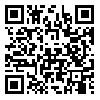Volume 77, Issue 6 (September 2019)
Tehran Univ Med J 2019, 77(6): 401-404 |
Back to browse issues page
Download citation:
BibTeX | RIS | EndNote | Medlars | ProCite | Reference Manager | RefWorks
Send citation to:



BibTeX | RIS | EndNote | Medlars | ProCite | Reference Manager | RefWorks
Send citation to:
Khorasanizadeh S, Behnaz F, Ebrahimy Dehkordy M, Teymourian H, Kouzekanani H. Iatrogenic severe hypoglycemia in a non-diabetic patient under general anesthesia: case report . Tehran Univ Med J 2019; 77 (6) :401-404
URL: http://tumj.tums.ac.ir/article-1-9932-en.html
URL: http://tumj.tums.ac.ir/article-1-9932-en.html
Shayesteh Khorasanizadeh1 
 , Faranak Behnaz *
, Faranak Behnaz * 
 2, Masih Ebrahimy Dehkordy1
2, Masih Ebrahimy Dehkordy1 
 , Houman Teymourian1
, Houman Teymourian1 
 , Homeyra Kouzekanani1
, Homeyra Kouzekanani1 


 , Faranak Behnaz *
, Faranak Behnaz * 
 2, Masih Ebrahimy Dehkordy1
2, Masih Ebrahimy Dehkordy1 
 , Houman Teymourian1
, Houman Teymourian1 
 , Homeyra Kouzekanani1
, Homeyra Kouzekanani1 

1- Department of Anesthesiology, Shohada-e-Tajrish Hospital, Shahid Beheshti University of Medical Sciences, Tehran, Iran.
2- Department of Anesthesiology, Shohada-e-Tajrish Hospital, Shahid Beheshti University of Medical Sciences, Tehran, Iran. ,faranak.behnas@gmail.com
2- Department of Anesthesiology, Shohada-e-Tajrish Hospital, Shahid Beheshti University of Medical Sciences, Tehran, Iran. ,
Abstract: (2761 Views)
Background: Hypoglycemia is a condition when blood glucose level is lower than 70 mg/dl in people without diabetes. The symptoms of hypoglycemia include tachycardia, sweating, pallor, pupillary dilatation. Hypoglycemia is a non-lethal and often preventable clinical problem in non-diabetic patients that can occur during fasting or after dining.
Case presentation: A 52 years old man referred to Shohada-e-Tajrish Hospital, Tehran, with diagnosis of kidney stones candidate for percutaneous nephrolithotomy (PCNL). The patient underwent general anesthesia and after 40 minutes, the surgeon requested injection of tranexamic acid because of bleeding, but unintentionally the patient received 100 unites of crystalline insulin by nurse anesthesia. Vital signs were stable, the patient's blood glucose was 85 mg/dl and he had no sweat. Then the therapeutic intervention consisted of administering a bolus dose of 50 cc 50% dextrose water (DW) and then infusion of 50% dextrose water over that time. The patient was monitored for 10 hours in recovery and also received 1 mg of glucagon. The blood glucose was checked frequently. Fortunately, there were not any detectable hypoglycemic attacks (blood glucose less than 70 mg/dl) during that time. Throughout the first three hours in ICU, he suffered from severe hypoglycemic episodes and treated by DW 50% (bolus stat and infusion) and after stabilization of vital signs he transferred to ward.
Conclusion: The mortality of iatrogenic hypoglycemia is lower than other causes of hypoglycemia. However, on time diagnosis and aggressive treatment can prevent serious complications. In addition, proper communication between health care providers and precise checking of drugs labels before injection can dramatically decrease these events.
Case presentation: A 52 years old man referred to Shohada-e-Tajrish Hospital, Tehran, with diagnosis of kidney stones candidate for percutaneous nephrolithotomy (PCNL). The patient underwent general anesthesia and after 40 minutes, the surgeon requested injection of tranexamic acid because of bleeding, but unintentionally the patient received 100 unites of crystalline insulin by nurse anesthesia. Vital signs were stable, the patient's blood glucose was 85 mg/dl and he had no sweat. Then the therapeutic intervention consisted of administering a bolus dose of 50 cc 50% dextrose water (DW) and then infusion of 50% dextrose water over that time. The patient was monitored for 10 hours in recovery and also received 1 mg of glucagon. The blood glucose was checked frequently. Fortunately, there were not any detectable hypoglycemic attacks (blood glucose less than 70 mg/dl) during that time. Throughout the first three hours in ICU, he suffered from severe hypoglycemic episodes and treated by DW 50% (bolus stat and infusion) and after stabilization of vital signs he transferred to ward.
Conclusion: The mortality of iatrogenic hypoglycemia is lower than other causes of hypoglycemia. However, on time diagnosis and aggressive treatment can prevent serious complications. In addition, proper communication between health care providers and precise checking of drugs labels before injection can dramatically decrease these events.
Type of Study: Case Report |
Send email to the article author
| Rights and permissions | |
 |
This work is licensed under a Creative Commons Attribution-NonCommercial 4.0 International License. |



